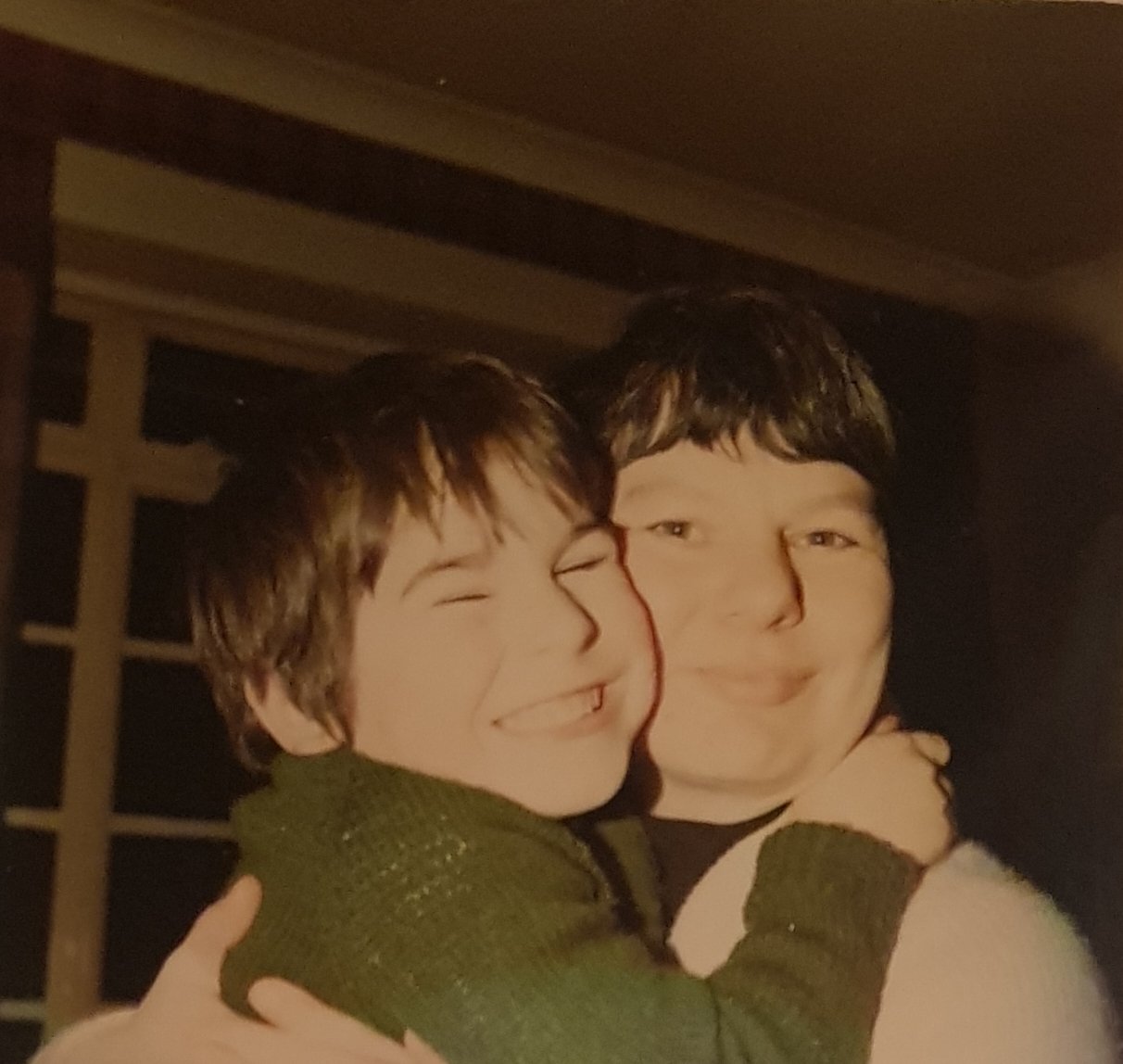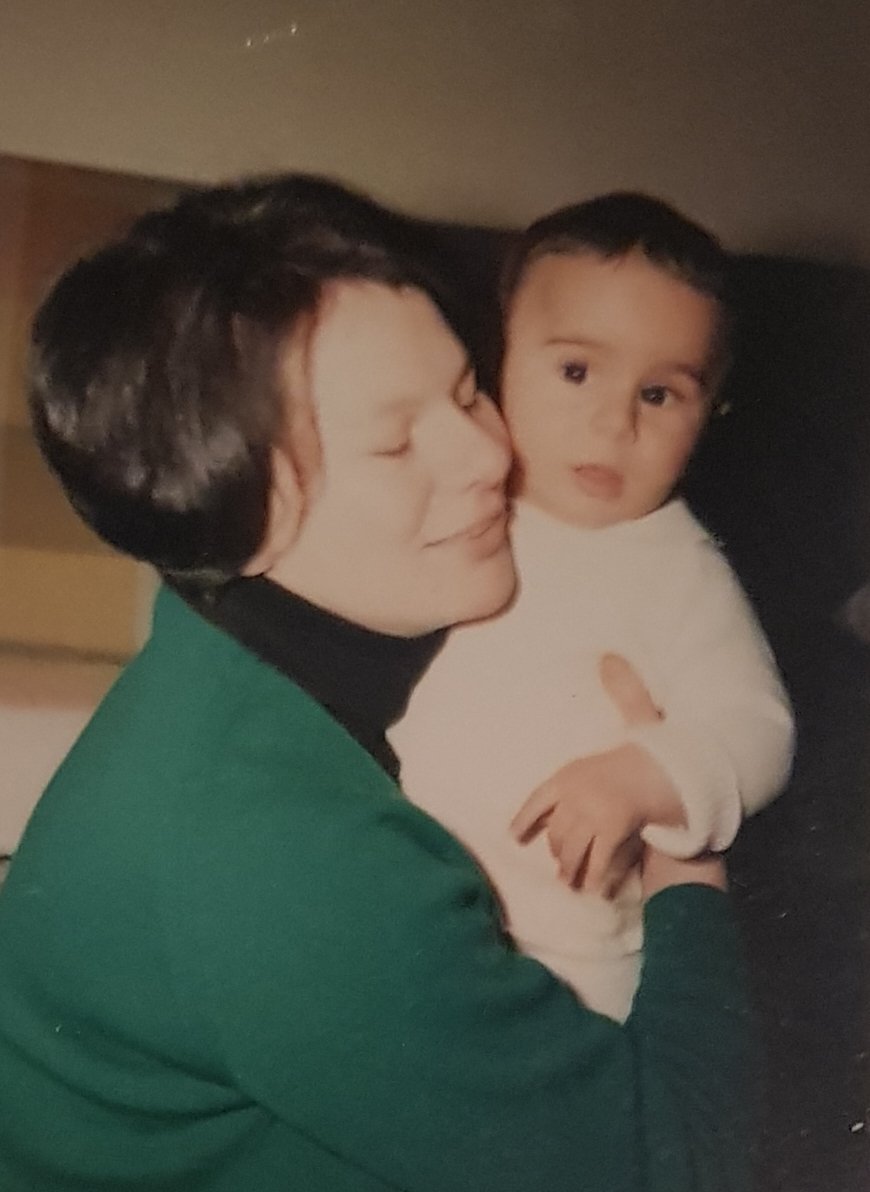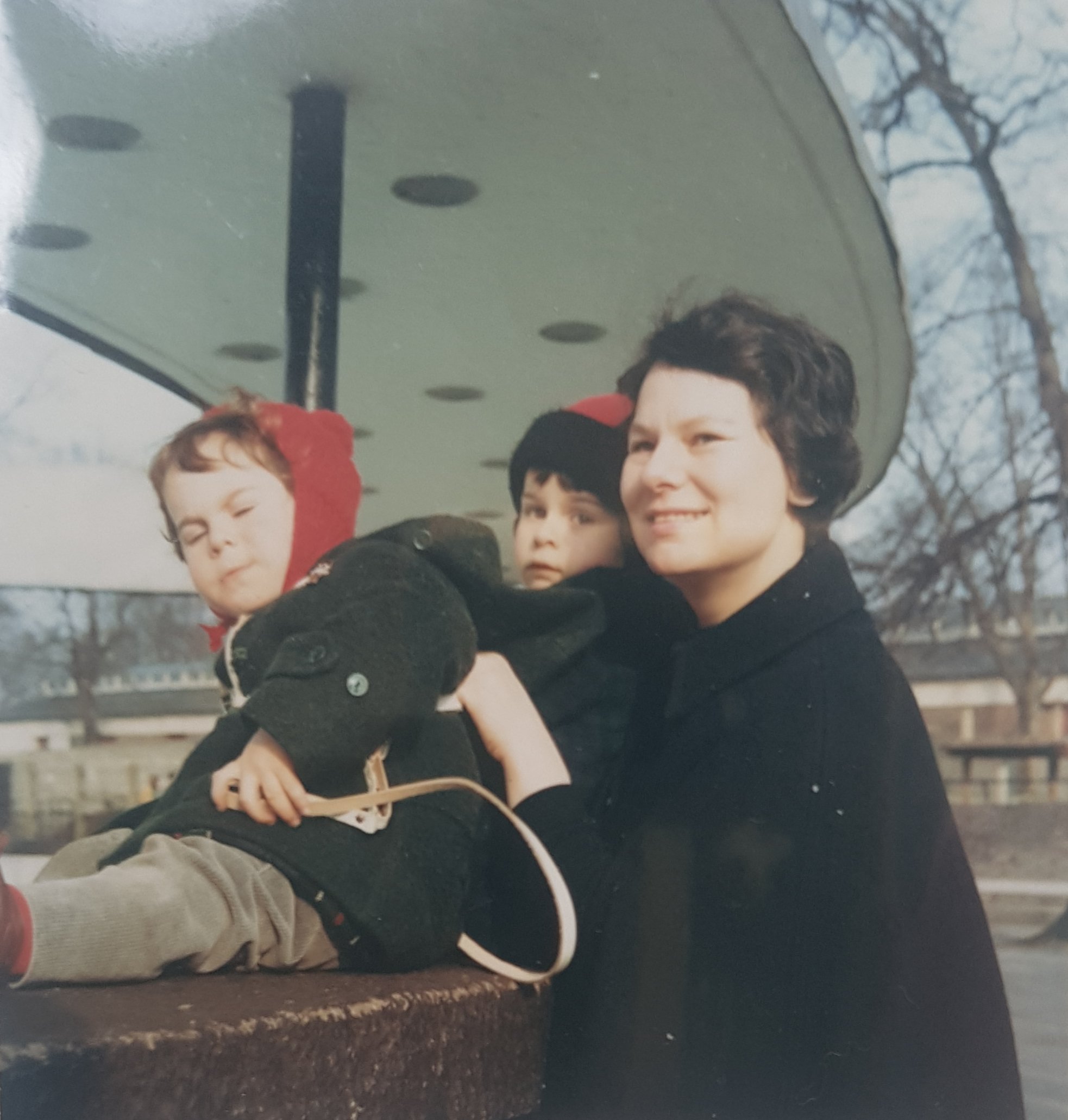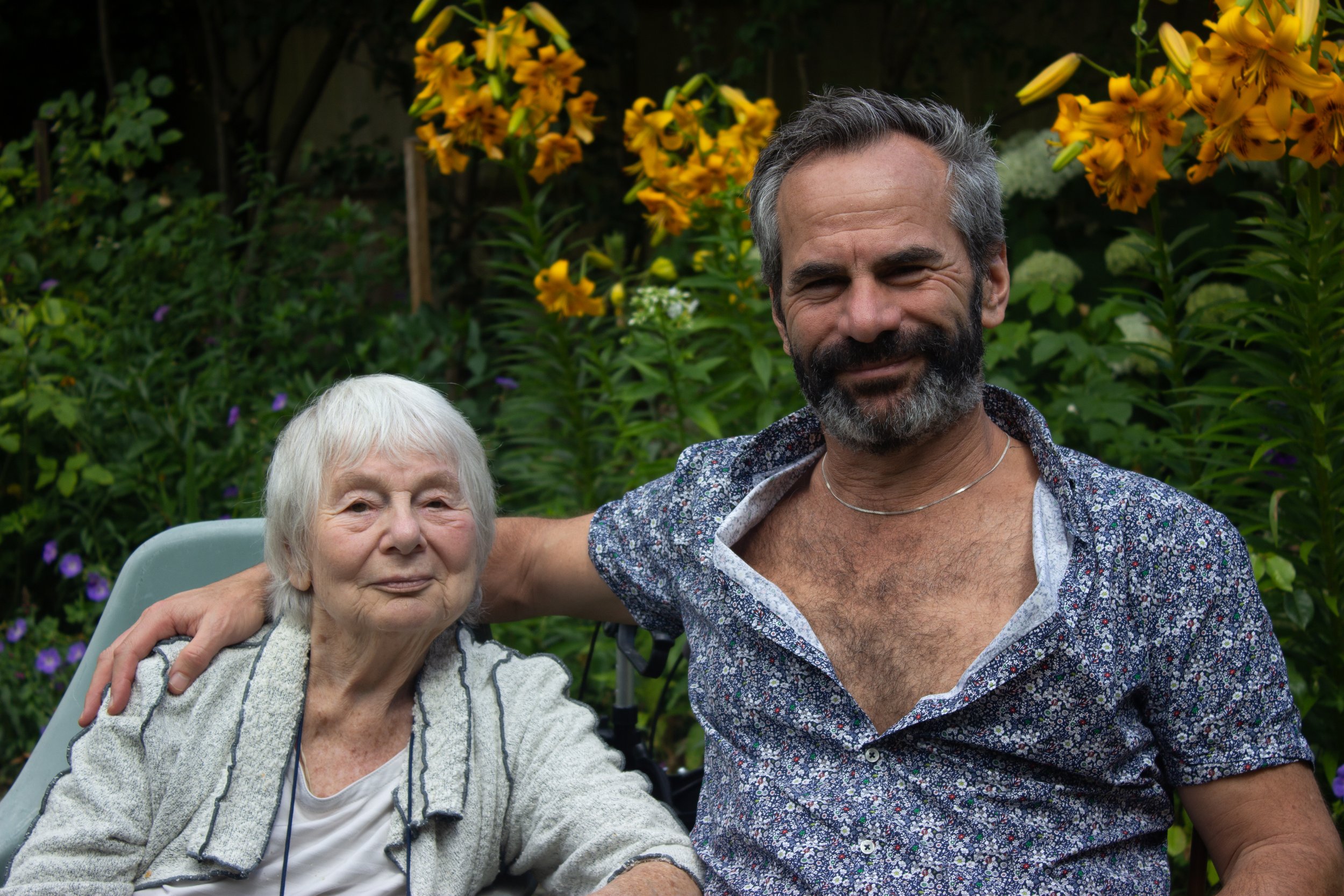Oma, as I discovered when I was about eight years old, wasn’t actually called ‘Oma’—she was ‘Betty’—‘Oma’ was German for ‘grandmother’. Oma and my 7-year-old mother had come over to London as Jewish refugees from Berlin in 1939. When I was very young, I sometimes mixed-up Oma with auntie Rose: both warm, loving, caring. Oma spoke with a thick German accent. But she could also be quite pushy: I remember her shoving commuters as we climbed aboard a London bus. Oma would stare intensely into your face when you ate which I always found disconcerting. When I was about 13, my best friend James and I borrowed £5 from her to go to the arcade. We said that we would mow the lawn at her house in Wood Green in return. She reminded me about that week after week but we never did it. I always felt guilty about that: right up until Oma died in the mid-1980s.
Another thing that still makes me shudder with shame. Mick Jagger came to visit the Office. He was considering a part in a film by the German director Werner Herzog and my parents had some of Herzog’s films, so they were going to show it to him at their mezzanine cinema. Davina, about 12-years-old at the time, said that she wanted to be in charge of showing him around. I was a bit nonplussed about it all until the day of the visit, when I decided that, in fact, I did really want to meet him. I rushed back to the cinema from the arcade and, as cool I could, pulled back the velvet curtain, walked into the cinema, and took a seat. I remember Jagger looking up at me as I entered, an expression of vague disinterest. The film was one of those excruciatingly dull foreign language films that my parents distributed. I remember something about a circus and a market. After what seemed an eternity the film ended, and Jagger stood up to go. My dad stood up and shook Jagger’s hand, then Davina did, then others, then I stood up with my hand outstretched. He walked straight past me and out of the cinema. I felt mortified and thought about chasing after him, down the street, so that he would give me a proper handshake. I still feel a pang of embarrassment every time I see pictures of Jagger or hear music from the Rolling Stones.
***
One of the amazing things about growing up in this world was getting to go to the film festivals. Cannes was an annual event in the Spring. For Davina and myself, that meant swimming, playing in the sand, and lounging beneath the umbrellas of the beach clubs: each club with its own adornment of different coloured stripes. We had ham and cheese toasted sandwiches for lunch. Dinner was in small local restaurants. A special treat was steak tartare: raw minced beef forked together with eggs, ketchup, and herbs, my mum looking nervously on. One year, Davina and I were asked to ‘host’ the stall for my parents’ independent film distributors association. We sat proudly behind a desk in the large festival arena, handing out leaflets. Sometimes we also got to go to the films: mostly of the long, boring subtitled types; but children’s films were also sometimes on the programme. One that Davina and I particularly liked was ‘Stubby’, about a young Swedish boy who is so good at football that he ends up playing for the national team. We loved the film so much—Stubby darting through the legs of the grown-up players—that we convinced our parents to buy its UK distribution rights. It bombed: my parents said that no children wanted to watch a film with subtitles.
One night, when Oma came to Cannes with us, my parents stayed out really late. Davina and I were back at the apartment with Oma looking after us, and I remember growing more and more anxious. Where were they? Why weren’t they back yet? I was convinced something awful had happened to them. Panic: a gnawing emptiness in my stomach, something I couldn’t control. I felt like a hole had opened in the earth and I was falling through, nothing to grip on: accelerating, terrified, down and down. Oma seemed scared too. Eventually, maybe 2am or so, my parents returned. No big deal, just a late party. Silence.
And then there was ‘The Machines’ at Venice: the happy place I would go to many years later if asked to visualise a place of safety and joy. We didn’t go to Venice as often as Cannes, but it was the same time of beaches, swimming, and sun lounging for Davina and myself. And just on the main street of the Lido—the sliver of Venice on which the film festival was held—was an arcade that stretches back beyond my earliest memories. Walking past stalls of fresh coconut, their aroma filling the warm night air, was a utopia of mechanical games, lights, and excitement: table football, penny falls, a mini bowling alley.
Some years ago, I began to recognise a lot of parallels between my parents going to film festivals and my own going to academic conferences: the networking, the schmoozing, the being part of a big community. Bumping into old colleagues and talking about the latest research findings or measures—just like my parents talking about the latest films with fellow distributors, directors, and reviewers. It wasn’t a conscious choice for me to enter this world, but perhaps, at some level, it was a way of doing things that felt safe and familiar. Or perhaps I entered into academic life with a confidence borne of seeing my parents immersed and engaged in their own community.
***
One of the best things about a day at the Office was lunch. My parents’ work day seemed to start late, about 10 o’clock, and by noon or so (with a coffee break in between) we’d be talking about where to eat. Italian was the norm, and I’d gobble up my favourite: spaghetti Bolognese. Chinese was also very popular. Oma would take us some times. Davina and I had a reputation for being badly behaved, though I’m not sure we ever were. I do remember once, though, at the Dumpling Inn Chinese restaurant, breaking set after set of chopsticks as we used them for drumming. Oma said, many times after that, that we’d nearly got thrown out of the restaurant.
It wasn’t lost on me: the contradiction between the privilege that we had, and the communism that my parents—and I—espoused. Kids at school would sometimes tease me: if your parents are communists why do you live in a big house in Highgate (a posh London suburb)? One time, there was almost a revolution at my parents’ company. I found out because, driving to work one day, I could hear them talking about an employee—someone close to them—who was stirring up trouble. I was worried it was Auntie Rose and asked. They said ‘No’. It turned out it was the boyfriend of one of my older sisters, who had been working for my parents for about a year or so. He was a bright, ambitious young man, with a pointy beard that made him look like Guy Fawkes. My parents said he was an anarchist. This boyfriend had been steadily promoted, but was now asking that awkward question: if the company was advocating socialism, why was it owned by three bosses (my parents and Uncle Harry) and not a workers’ collective? Worse, he was actually trying to collectivise it. Around half or so of the employees rallied behind him, and for some time my parents were genuinely worried that they might lose control of the company, but eventually the boyfriend left and things returned to normal.
***
By the time I got to my mid-teens, going to the Office meant getting the tube in to Tottenham Court Road with James, badgering my dad for ‘Luncheon Vouchers’, then going off to McDonalds for Big Macs, fries, and milkshakes before spending the afternoon in the arcades. By that time, I was quite seriously addicted to fruit machines—something I only really kicked in my early 20s. Sometimes I took money from my parents. Worse was asking my parents for money to buy clothes, getting the cheapest possible, then spending the rest in the arcades. I think my own kids have been surprised that, when they’ve taken money from me without asking, I’ve never got that angry. But how could I when I did that even worse.
When I was around 18, my parents felt that they couldn’t afford the rents in Soho any more and moved their offices to our house in Highgate. My dad had his own office, my mum shared with a few other staff that moved with them (including, later, Eric Liknaitzky). But my dad was increasingly losing heart, and the realities of the film business at that time meant increasingly big financial risks, which my parents were never really willing to take. The fall of the Soviet empire—and the dissolution of the British Communist Party that followed—also really hit my dad: his life’s meaning had been fundamentally scythed and he never really recovered from that. Nevertheless, my dad continued to work well into his 80s, though by that time it was more sitting in his swivel chair, pushing around a few bits of paper, and speaking into his dictaphone. He talked of making a film about his grandfather Moishe who was kidnapped into the Czar’s army as a young Jewish boy, and actually wrote up a script. Almost 40 years later, my daughter, Maya, would turn that into a short film.
***
Ironically, the films I adore now are exactly the sort that my parents’ distributed, and which I despised as a kid. Sometimes, I’ll see a really good film and, when I tell my mum about it, she’ll say, ‘Oh, that was one of ours’. I tease my kids—products of a TikTok era where nothing last longer than 10 seconds—that they should join me to watch seven hour epics about communal farms in Slovakia. ‘There’s a scene in it’, I tell them, ‘which goes on for an hour and consists of watching a doctor get drunk in real time.’
‘Daaaad….!’
‘And then there’s an opening shot of 20 minutes of cows walking across a field’. ‘Or we could watch the three hour one about the dad and his daughter in a hut eating potatoes’.
‘Daaad….!’
‘You know what happens?’
‘Whatttt?’
‘Their horse dies.’
***
As therapists, the focus of our work is often on how the past informs the present; and we know how complex this relationship is. Somehow, through these experiences of growing up around cinema—and through thousands of other experiences—I emerged: not created by these experiences; but touched and swayed and nudged. Something complex, rich, ethereal mingled with me, enticed me, helped me develop form. I shaped myself against this world: these people, this community, these machines. When I see myself as a whole, I am also the boy jumping on his dad’s sofa, and getting dragged out of the arcade, and answering the phone on his Auntie Rose’s lap; and all the traces of those experiences as they wove their way through my life. There’s no cause-and-effect here. No simple x made me y. But through that love, that culture, those experiences of joy and shame—through all that multifaceted, intermingled complexity—my own complex and multifaceted way of being and being-in-relation evolved.



















